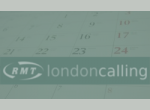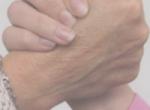Similar topics:
WHAT IS THE ETF?
The European Transport Workers’ Federation, linking transport trade unions across Europe. RMT is one of several UK affiliates.
Its Women’s Committee includes nominees from various countries and sectors. I am a member of the Committee for the term 2013-2017.
PRIORITY CAMPAIGN 1 – VIOLENCE AGAINST WOMEN TRANSPORT WORKERS
Despite having no funding for this campaign, we have been able to take a couple of useful initiatives:
- The VIOLENCE AGAINST WOMEN TRANSPORT WORKERS – IT’S NOT PART OF THE JOB posters: RMT submitted a design drawn up by members, which is multilingual and is been displayed in many workplace sin many countries.
- An online survey collecting women transport workers’ experiences of violence at work – this is supposed to have ’gone live’ by now, but there have been delays.
PRIORITY CAMPAIGN 2 – WOMEN’S HEALTH AND SAFETY
- This work is mainly based around a training module. The Committee commissioned an ‘expert’, who delivered a draft that: was dry in tone; overlooked key issues eg. PPE, facilities; separates physical health and stress.
- The Committee has rejected this and will revise it to overcome these shortcomings. I have emphasised the importance of drawing on the talents of our own rank and file rather than relying on ‘experts’; I have also argued for the inclusion of a section on exercising your legal right to refuse to work on the grounds of health and safety concerns.
ISSUES FOR EUROPEAN WOMEN TRANSPORT WORKERS
As well as these, women transport workers across Europe face many common issues:
- austerity
- casualisation of employment: agency, temporary, zero-hours, bogus self-employment, etc.
- violence
- refugees and migrant workers
- the stubbornly-wide gender pay gap
WOMEN’S EMPLOYMENT IN TRANSPORT
The proportion of women transport workers continues to increase, assisted by both opposition to sexism and development of technology that makes eg. dock work less physical.
20% of railway workers are women; however, only 2% of train drivers are women – in some countries, 0%!
PRIVATISATION / LIBERALISATION
EU Directives have encouraged privatisation and liberalisation. The 4th Railway Package has been slightly amended as a result of campaigning (eg. to allow direct award of contracts), but is still a serious attack.
Many EU transport liberalisation policies are based on UK (Tory) government policies eg. separation of railway operations and infrastructure; the current drive to abolish of registrations of dockers (in the 1980s, the Tories scrapped the National Dock Labour Scheme). The UK government certainly does not have the excuse that the EU is forcing it to privatise transport!
EUROPEAN CITIZENS’ INITATIVE: FAIR TRANSPORT EUROPE
The ETF has a campaign for measures to improve public transport and workers’ conditions: although the demands are limited, they include stronger workers’ rights, trade union recognition, ending zero-hours contracts and bogus self-employment.
If this initiative gets one million signatures from people in EU-affiliated countries, then there will be a formal meeting with the European Commission and possible action by the European Parliament.
I urge members to add your name, which you can do here: https://www.fairtransporteurope.eu/
REFUGEES AND MIGRANTS
The Committee heard from Alexander Kircher of the EVG union (Germany) about the union’s work opposing hostility to migrants.
“We have a responsibility as trade unionists to integrate migrants. If we fail, there will be a different Europe, one with large right-wing movements, one in which I would not wish to live.”
EVG involves youth reps in migrant organising.
When employers exploit migrant workers to drive down pay, EVG demands government action against the employers, not action against immigration.
LINKING AND LEARNING
We can use the Committee to build links between women transport trade unions in various European countries. For example, LT Regional Council and the National Women’s Advisory Committee asked the union to organise a visit by Bulgarian women trade unionists to this country, to visit workplaces and speak with Eastern European workers eg. Tube cleaners. This request has yet to be acted on.
European unions have produced materials which we can use, for example the annual Kommunal (Sweden) International Women’s Day video. ETF produced a video about bullying and harassment at sea.
We can also learn from unions in other European countries, some of which are ahead of us in organisation and representation for women.
eg. A recent merger of unions in the Netherlands has formed FNV, which has an active FNV-women section; Kommunal gives all its staff ten days’ equalities training.
MID-TERM CONFERENCE
The major event of the 2013-2017 Committee term of office is the mid-term conference, which will take place in Bucharest on 12-13 April. There will be guest speakers; presentations on a recent study on women in transport; organising migrant women transport workers; and update on the Committee’s work, and a half-day of workshops identifying issues for future campaigning.
I have urged RMT to send a decent-sized delegation, and I hope this will include members of the Women’s Advisory Committee as well as the Executive. This is currently being discussed by the Executive’s Equal Rights Sub-Committee.
E.U. REPORTS
- Opinion on Women and Transport: useful facts and statistic but promotes ‘women in business’ as a way forward.
- EU Transport Commissioner Violeta Bulc: ‘brainstorm’ identified cultural/attitudinal barriers to women working in transport, but understated practical barrier eg. shiftwork, childcare.
USEFUL MATERIALS FROM ETF
- annual report on women and transport
- input into bodies such as the International Labour Organisation (ILO) eg. women’s issues added to ILO code of practice on safety and health in ports.
GENERAL / CONCLUSIONS
The ETF Women’s Committee, and RMT’s involvement in it:
- provides a vital link-up between women transport trade unionists across Europe
- has enabled some good work to be done
- has great potential.
However, it is excessively bureaucratic and less effective than it could be. An apparent disinterest from our union does not help. Whenever I attend a Committee meeting (twice yearly), I send in a detailed report with recommendations, but I have never received any response indicating that the union has discussed the report or will act on its recommendations. I hope that now I have been elected to the National Women’s Advisory Committee, this can change, and we can make more of our involvement.
- Janine's blog
- 3632 reads





